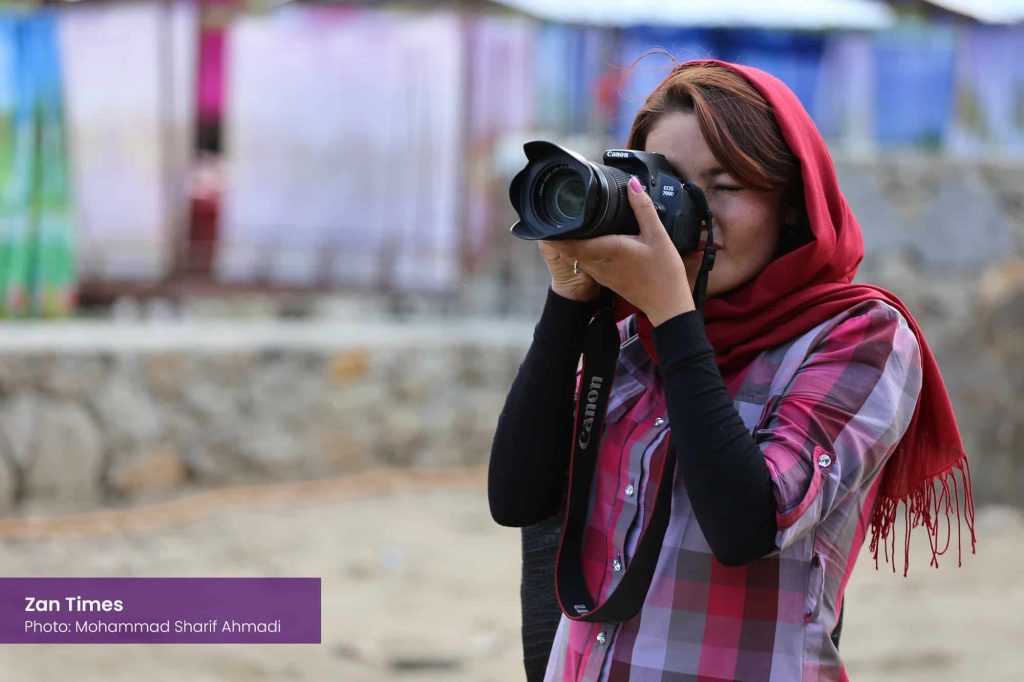
I have been working as a local reporter for Zan Times for about seven months now. It is very difficult for a woman to work as a journalist in Afghanistan. The Taliban have imposed numerous restrictions on women. Women cannot leave the house without a veil, let alone holding a recorder and freely interviewing people. If the Taliban see a reporter interviewing anyone, they detain him or her and subject them to physical abuse.
For example, one day I was walking home when I passed by the provincial governor’s office where I saw several women and men congregating, having staged a protest. When I inquired about the situation, they told me that the Taliban had thrown them from houses that were given to them by the previous government and had given their houses to their own Taliban forces. Then, I noticed that Taliban gunmen were beating a local reporter with their rifle butts. A Taliban grabbed his camera and slammed it on the floor and said, “Why are you talking to a woman?”
From that day on, I am very scared. This dread never leaves me, whether I am at home or outside. When I leave home for an interview, I am not sure of returning again. The fear of being imprisoned or murdered by the Taliban always haunts me. I am more afraid of my father being harmed, because he accompanies me around as a mahram since the Taliban does not allow solo women to walk around freely. I am terrified that the Taliban might harm or imprison him because of me.
Sometimes I find it extremely difficult to find sources for reports I’m researching because people are afraid and don’t easily believe that I am a journalist. They do not talk, because they are afraid that I might actually be a member of Taliban intelligence pretending to be a journalist. They are reluctant to talk to me and other journalists or give us accurate information for fear of Taliban reprisal.?
When someone whom I don’t know well shows a willingness to be interviewed, I get fearful that they might be from the Taliban intelligence and looking to identify me for arrest. Another big worry is that I now know that my telephone SIM cards are likely under surveillance by the Taliban. I suspected this after I contacted some people by phone for interviews when, at around nine or 9:30 at night, I received several calls from unknown numbers. The person didn’t say anything and I got worried that it was an intelligence attempt to find my location. That night, I threw away my SIM cards and my family sent me to live away from them for a few days.?
Even there, the fear didn’t leave me. I was afraid that if they identified my location then they would arrest my family. “What should I do and what solution should I find to save them?” I thought. Sometimes, these fears paralyze me and I could not do my work properly.
I have seen this fear many times in my interviewees, which is why they insist that I not reveal their identities. Even after I make that promise, I still see that they cannot talk to me easily and freely and share all their information, especially women peddlers, the poor, labourers, or orphaned children who work on the roads who are very afraid of being arrested by the Taliban.?
In our city, there are check points on every corner. In addition, Taliban mobile patrols are on the road all the time. A month ago, I was sitting on the side of the road interviewing a poor woman when a Taliban patrol took interest as they passed by. I took a deep breath and hid my mobile in my sleeve but couldn’t get a proper interview due to extreme stress.
Another time, I was interviewing another woman on the road. About 15 to 20 metres away was the Taliban checkpoint. During the interview, a group of Taliban walked out into the middle of the road. I noticed that the lady was starting to tremble. When I asked why, she said, “The Taliban have given orders to all hawkers that we should not hawk on the roads.” She thought they’d arrest her again while I was afraid they’d arrest me for interviewing her. So I said to that lady, “Mother! Calm down! If they approach us, tell them that I am a customer and if you don’t sell these things, where will you find a bite to eat.” When the Taliban came near, I pretended to be a customer and they passed us by.?
Even with all these worries and fears, I am very happy to continue to work in such conditions so I can tell of the problems of Afghan women and the marginalized, while hoping for the day when Afghan women can live freely and have access to their human rights.
About the Author: Sana Atef is the nickname of a local reporter working for Zan Times.
*Alongside Zan Times, Women’s eNews is publishing stories from mainly women journalists working both inside and outside Afghanistan, telling stories of the marginalized populations who rarely have a voice to shape and inform public discourse, believing that change begins with awareness. Having previously worked as journalists in Afghanistan, they are aware of the challenges, dangers, and opportunities of working in the media landscape and are doing their part to make sure the stories of the country are told.

